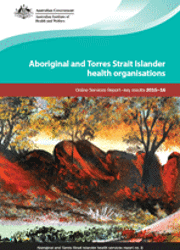Summary
This eighth national report presents information from 277 organisations, funded by the Australian Government to provide one or more of the following health services to Aboriginal and Torres Strait Islander people: primary health care; maternal and child health care; social and emotional wellbeing services; and substance-use services. These organisations contributed to the 2015–16 Online Services Report. Information is presented on the characteristics of these organisations; the services they provide; client numbers, contacts and episodes of care; staffing levels; and service gaps and challenges.
The good news
- In 2015–16, 204 organisations provided a wide range of primary health-care services to around 461,500 clients through 3.9 million episodes of care. Over 1 million episodes of care (26%) were in Very remote areas and these areas had the highest average number of episodes of care per client (10). Over time there has been an increase in the average episodes of care per client, from 5 in 2008–09 to 8 in 2015–16.
- Around 7,766 full-time equivalent staff were employed and just over half (53%) were Aboriginal and Torres Strait Islander. Nurses and midwives were the most common type of health worker, representing 15% of employed staff, followed by Aboriginal and Torres Strait Islander health workers and practitioners (13%) and doctors (7%). Nurses and midwives represented a higher proportion of employed staff in Very remote areas (24%).
- Many health promotion group activities were provided, including around 7,600 physical activity/healthy weight sessions, 3,300 chronic disease support sessions and 2,000 tobacco-use treatment and prevention sessions. With respect to maternal and child health care, around 12,900 home visits, 3,300 maternal and baby/child health sessions, 2,800 parenting skills sessions and 1,000 antenatal group sessions were done.
- In the 93 organisations funded specifically to provide social and emotional wellbeing services, 216 counsellors provided support services or Link Up services to around 18,900 clients through 88,900 client contacts.
- In the 80 organisations funded specifically to provide substance-use services, around 32,700 clients were seen through 170,400 episodes of care. Most clients (81%) and episodes of care (87%) were for non-residential substance-use services.
Things to note
- Over half the organisations providing primary health-care services reported mental health/social and emotional wellbeing services as a service gap (54%), and two-thirds (67%) reported the recruitment, training and support of Aboriginal and Torres Strait Islander staff as a challenge in delivering quality health services.
- Some organisations felt clients with high needs had to wait too long for some services, in particular to access specialist and dental services. For example, 53 (28%) organisations providing on-site or off-site access to dental services still felt clients with high needs often had to wait a clinically unacceptable time for dental services. For most specialist and allied health services, more organisations in Remote and Very remote areas felt clients with high needs had to wait too long to access services.



